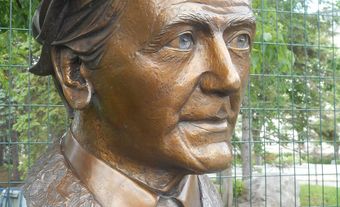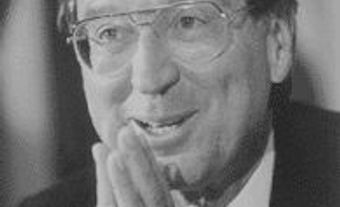The
Commission of Inquiry on the Position of the French Language and on Language
Rights in Québec (1969–1973) is a royal inquiry commission set up by the
government under Jean-Jacques Bertrand. Noting the inequality between the English and French languages and the federal state’s hesitancy
to take measures to encourage the independence and general development of the
French Canadian population, the Gendron Commission elaborated a series of
recommendations which led to the adoption of the Language Acts in 1974 and 1977
(see Quebec
Language Policy).
Emergence of the State as a Stakeholder in Language Matters
Some intellectuals started to see similarities between the French Canadians’ position and that of southern colonized countries and began searching for ways to freedom. Others, in larger numbers, believed that the state should intervene and reverse the trend in anglicization. In Quebec, politicians thought that this exception would be justified if they could defend “Quebec’s special position in the Canadian federation.” The Quebec Liberal Party, elected in June 1960, consolidated the government corporation Hydro-Québec, oversaw the nationalization of electricity, inaugurated the Quebec Government Office in Paris and the Service du Canada français d’outre-frontières and created the Office québécois de la langue française. The motive was to make Quebec an interventionist state where language matters are concerned.
In February 1968, Canadian prime minister Lester B. Pearson called a federal-provincial constitutional conference. At the time, the provincial premiers seemed ready to shift paradigms for both Quebec’s special status and Canada’s bilingualism to be recognized. Yet, Pierre Elliott Trudeau, at the time minister for justice, expressed his view that the need for these recognitions would evaporate once equality was reached among all persons. Then, all forms of asymmetry or decentralization would only represent “privileges” given to the Quebecers people which, in his opinion, would allow them to continue down the slippery road to independence. This harsh line traced by Trudeau offered more arguments to those who were unhappy at the idea of compromising with Quebec.
Saint-Léonard Crisis
The situation took a turn for the worse in an area north of Montreal, where the desire of many Quebecers to live in French clashed with many residents’ wishes concerning their children’s education. In Saint-Léonard, where 40per cent of the population was of Italian immigrant descent, the conditions became dire. Most of the children attended English school and the Francophones noticed the anglicization in their neighbourhood. The culmination would trigger the language crisis.
In Quebec, nine out of ten immigrant families sent their children to English school. In the nationalist mind, the situation in this particular neighbourhood represented an example of a larger tendency, and even a threat. To counter this phenomenon, Francophone parents, led by lawyer Raymond Lemieux from the Mouvement pour l’intégration scolaire, demanded that French be recognized as the only language for teaching. The school board adopted that position on 27 June 1968. That year, bilingual classes first introduced in 1963 were cancelled, and new primary school students had to enroll in French school. Several parents from the Italian community protested by opening secret schools in private residences. Meanwhile, Anglophones tried to transform Aimé-Renaud secondary school, the only one in the neighbourhood, into an English language establishment. In September 1968, Francophone students responded by occupying the school for ten days. This was covered by the media and the conflict spread everywhere in Quebec, where protests were organized in support of both anglophone and francophone camps. The language crisis had started; the government would have to react.
The crisis brought forward the issue of immigrant integration. While French was the majority’s language, it seemed to lack the social, political and economic influence needed to attract newcomers. The Saint-Léonard crisis was the start of a linguistic reconquest. On 3 September 1969, 5,000 francophone, anglophone and allophone protesters faced each other in the neighbourhood streets. This was the moment that led to Jean-Jacques Bertrand’s Union Nationale government to introduce Bill 63, the Act to Promote the French Language in Quebec. Through Bill 63, the Office de la langue française was given the mandate to recommend measures to the government to make French the working language in public and private companies and the main language on public posters. The bill also confirmed that parents had the freedom to choose the language in which their children would be educated. Many voters deemed this to be too timid a statement. This measure made Francophones angrier and led to protests which united more than 30,000 people in Montreal and Quebec City.
Birth of the Gendron Commission
On 9 December 1968, the government created the Commission of Inquiry on the Position of the French Language and on Language Rights in Québec to:
[M]ake inquiry and report on the position of French as the working language in Quebec and recommend actions to:
1) support the language rights of the majority and protect that of the minority;
2) ensure the full development and spread of the French language in Quebec, in all lines of business, be they educational, cultural, social or economic in nature.
The Commission was chaired by Jean-Denis Gendron, a linguist and assistant dean at the faculty of arts at Laval University. He was joined by ethnologist Madeleine Doyon-Ferland, constitutionalist Edward McWhinney, jurist Nicolas Mateesco-Matte and public relations specialist Aimé Gagné. The commissioners were tasked with clarifying the complex issue of the inferiority of the French language and the Quebec state’s role in the growth of French Canadians.
Work of the Gendron Commission
Robert Bourassa’s liberal government, elected in April 1970, amended the Commission’s mandate: it was now responsible “first and foremost for the issues of French language at the workplace, the integration of new Quebecers in the province’s Francophone community, and the language rights of our citizens.”
The Commission, joined by a team of jurists, sociologists, historians, economists and sociolinguists, launched a large research project whose scope and 28 resulting studies were unprecedented. A deeper analysis of the 1961 census revealed that, although French Canadian Quebecers formed the second largest demographic group in the country, they ranked 12th in average male incomes in Quebec. Quebecers of British descent earned 42 per cent higher incomes than the provincial average. Workers of Scandinavian, Dutch, Jewish, Russian, German, Polish, Asian, Ukrainian or Hungarian descent also earned higher incomes than French Canadians. Research also revealed that only 46 per cent of French Canadians and 14 per cent of allophones worked exclusively in French in Montreal. This reality forced 74 per cent of allophones to master the English language to ensure their socioeconomic mobility. If nothing was done, the decreased birthrate among Francophones coupled with the increased rate of linguistic transfer would potentially lower this group’s demographic representation within the country. They would go from 82 to 78 per cent in Quebec and from 63 to 58 per cent in Montreal by 1986.
These discoveries confirmed the urgent need to counter the socioeconomic dispossession of Francophones and to ensure a more balanced resource allocation among citizens.
During the eight sessions held by the Commission, there was higher participation than expected, and 120 briefs were presented. As a result, the Commission was not able to channel speech to pacify the situation as it had hoped. Instead, the citizens grew increasingly dissatisfied and were more motivated to adopt radical solutions.
Report of the Commission
The Commission’s report was 1,423 pages long and included 179 recommendations. It was submitted to the government on 31 December 1972 and made public on 13 February 1973.
The report provided a detailed analysis of the situation in private companies and public administration, existing language rights and language use among ethnic groups. The Gendron Commission observed that the province’s progressive integration into the North American economy made English increasingly attractive to allophones and Quebecers companies.
Bilingualism was considered a burden to be carried by Francophones and slowed the social advancement of unilingual Francophones. The Commission thus recommended that the government “make French the shared language of the Quebecers, in other words a language which, since mastered by everyone, would become the instrument of communication in situations of contact between Francophone and non-Francophone Quebecers.” English would then become one of two “national languages” in Quebec. The Commission suggested gradually making French the language for internal communications within companies, which would help increase the number of Francophones in the middle and upper tiers.
As for French language use among immigrants, the Commission recommended that French be recognized as the “shared language of the Quebecers” in the public context and in workplaces. French would then become the “instrument of communication in situations of contact between Francophone and non-Francophone Quebecers” (see Quebec Immigration Policy). While the report did not address the access to English language schools, it suggested that the province intervene, sometimes through persuasion and other times by coercion, to reverse the tendency among immigrant parents to enroll their children in English language schools, especially in Montreal.
Implications
The recommendations of the Gendron Commission were at the centre of Bill 22, the Official Language Act (1974) and Bill 101, the Charte de la langue française (1977).

 Share on Facebook
Share on Facebook Share on X
Share on X Share by Email
Share by Email Share on Google Classroom
Share on Google Classroom



